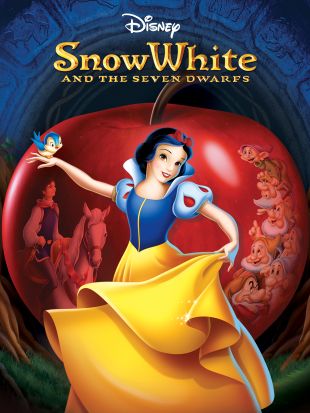
Snow White and the Seven Dwarfs, producer Walt Disney's 1937 masterpiece, is the most influential animated movie ever made. Why? Simply because nothing like it existed before Disney conceived of and willed it into being. Every animated film since owes a debt to its innovative storytelling and groundbreaking technical achievements. In 1934, Disney announced plans to make the first full-length animated feature, and stated that it would be filmed in Technicolor. Industry insiders thought he was just plain goofy to attempt what would almost certainly be a mega-flop. Not only had a feature-length cartoon never been made before, but it was widely believed that, even if Disney could pull it off, no one would pay to see a lengthy, animated fairy tale. In Hollywood, the three-year production became known as "Disney's Folly," as the original 250,000-dollar budget ballooned to 1.5 million and he had to borrow money to complete the film. Of course, in the end, Disney proved everyone wrong. Snow White was an instant smash with critics and the general public alike, and took in a then-staggering eight-million dollars at the worldwide box office during its initial run; at the time, it was the highest-grossing movie ever made.
Everything about Snow White is exemplary. For starters, Disney employed a multiplane camera to create an illusion of depth. In some of the more crowded scenes, it allows the characters, the trees and flowers, the animals, and everything in the background to move; nothing is stagnant. Disney brought out rich detail in every frame by painting on larger-than-normal animation cels, and his use of music was nothing short of revolutionary -- composer Jerome Kern (+Show Boat) told the New York Times in 1936: "Cartoonist Walt Disney has made the 20th century's only important contribution to music. Disney has made use of music as language. In the synchronization of humorous episodes with humorous music, he has unquestionably given us the outstanding contribution of our time." Snow White became the first film to release a soundtrack album, which featured such songs as "Whistle While You Work," "Heigh-Ho,"" and "Some Day My Prince Will Come." The score received the movie's only conventional Oscar nomination, although the Academy did give Walt Disney an honorary award for "a significant screen innovation which has charmed millions and pioneered a great new entertainment field" (the award took the shape of one ordinary statuette and seven smaller ones).

Based on the Brothers Grimm fairy tale, the story is simple enough. Snow White is a princess who lives with her vain stepmother, an evil queen. When the queen's magic mirror proclaims that Snow White has become more beautiful than her and is now the fairest in the land, the queen summons her huntsman to take Snow White into the woods and kill her. But the huntsman can't bring himself to do it, and instead tells her to run away and never come back. Snow White is then befriended by a number of woodland creatures, who take her to a nearby cottage where seven adult dwarfs live. There, she finds safe haven. But the queen soon learns that her stepdaughter is still alive. She disguises herself as an old hag and creates a poisoned apple that will cause anyone who eats it to enter a deep sleep. When she arrives at the cottage, the queen tricks Snow White into biting the apple, and the princess falls into a death-like state. Only "love's first kiss" can awaken her.
The story is, undoubtedly, a familiar tale to modern moviegoers, whether they have actually seen Snow White or not. Some might think it dated. Snow White herself is perhaps a bit dull, certainly when compared to the delightful dwarfs and even the wonderfully wicked queen, and is all too often content to react to circumstances rather than be proactive. A modern woman she is not. But these are small quibbles.

Variety film critic John C. Flinn Sr. raved in his 1937 review: "So perfect is the illusion, so tender the romance and fantasy, so emotional are certain portions when the acting of the characters strikes such a depth comparable to the sincerity of human players, that the film approaches true greatness."
That greatness was apparent in 1937. It still is today.
